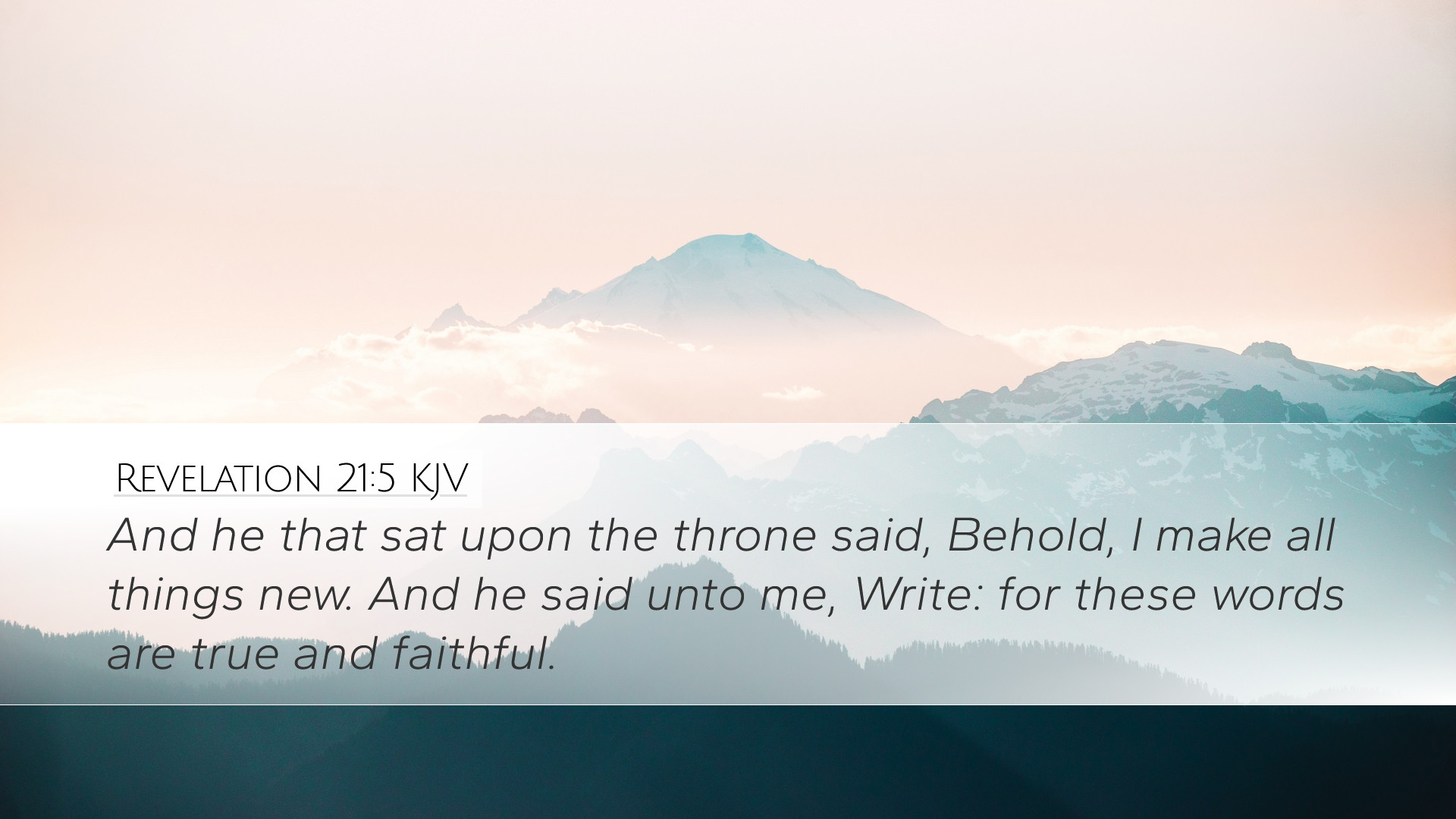Commentary on Revelation 21:5
Verse Text: "And he who was seated on the throne said, 'Behold, I am making all things new.' And he said, 'Write this down, for these words are trustworthy and true.'
Introduction
The concluding chapters of the Book of Revelation provide profound insights into God's ultimate plan for humanity and the cosmos. Revelation 21:5 presents a pivotal moment where God, represented by the figure on the throne, speaks with authority and assurance regarding the new creation. This verse encapsulates the essence of hope and renewal that characterizes Christian eschatology.
Contextual Analysis
Historical Background: The Book of Revelation, traditionally attributed to John the Apostle, was written during a time of intense persecution for early Christians. The promises encapsulated in this chapter served as a source of encouragement and hope for believers facing tribulation.
Literary Structure: Revelation 21 marks the transition from judgment to renewal. It portrays a vibrant vision of the New Jerusalem, where God ultimately fulfills His covenant promises. Verses 1-4 depict the eradication of sorrow and death, while verse 5 emphasizes divine proclamation and assurance.
Theological Themes
A. Divine Authority
The figure on the throne emphasizes His sovereignty: "Behold, I am making all things new." This assertion underlines God's authority over creation. As Matthew Henry notes, it signifies a total transformation that aligns with God's preconceived plan for redemption.
B. The New Creation
The concept of newness in the Bible reflects both qualitative and quantitative change. Albert Barnes observes that this renewal is not merely the restoration of what was lost, but a complete transformation. The phrase “all things” expands the horizon, indicating not just humanity, but the entire creation will experience renewal.
C. Trustworthiness of God's Promises
The command to “write this down” underscores the necessity of recording God’s promises for future generations. This is echoed in Adam Clarke's commentary, where he stresses that the reliability of divine speech invites believers to trust in God's eternal truth. The assurance that the words are “trustworthy and true” reinforces the certainty of the hopeful future God is offering.
Practical Implications for Believers
A. Living with Hope
For pastors and theologians, this verse serves as a foundation for preaching hope in the midst of despair. The assurance of new beginnings allows Christians to approach life's challenges with faith, knowing that God is actively at work. As Matthew Henry remarks, believers should continually look forward to the complete fulfillment of God’s promises.
B. Empowerment for Ministry
This verse can invigorate pastoral ministries, encouraging leaders to remind their congregations of the transformative power of God. As Clarke emphasizes, preaching about renewal can inspire people to seek a deeper relationship with God, engaging in personal and communal renewal.
C. Understanding Suffering
Recognizing that suffering is temporary in light of God’s future promises confers meaning upon trials. Barnes suggests that understanding the context of Revelation aids in developing a robust theology of suffering, as these challenges are ultimately leading towards a glorious future.
Conclusion
Revelation 21:5 stands as a testimony of God’s unwavering commitment to bring transformation and renewal. This verse encapsulates the Christian hope that lies not only in individual salvation but in the restoration of all creation. By embracing the truths found within this verse, pastors, students, and scholars alike can find rich insights for preaching, teaching, and living out their faith.
Key Takeaways
- Divine Sovereignty: God is in control and assures His creation of renewal.
- Hope for the Future: This renewal provides a beacon of hope for believers facing trials.
- Trustworthy Promises: All assurances from God are reliable and essential for faith.


